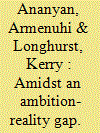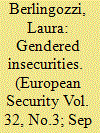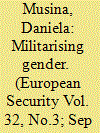|
|
|
Sort Order |
|
|
|
Items / Page
|
|
|
|
|
|
|
| Srl | Item |
| 1 |
ID:
191018


|
|
|
|
|
| Summary/Abstract |
Since 2000, the United Nations’ Women, Peace and Security (WPS) Agenda has addressed the causes and consequences of sexual violence towards women in conflict scenarios. After two decades of effort, an ambition-reality gap persists. Uneven commitments from UN member states, ongoing instances of conflict-related sexual violence around the globe and the lack of a critical mass of female participants in peace negotiations, security policy and politics in general, suggest that WPS has had limited effects. Despite its under-achievements, WPS objectives remain relevant, especially considering the amplifying effects that the Covid-19 pandemic and its fallout have had for gender inequality and conflict.
|
|
|
|
|
|
|
|
|
|
|
|
|
|
|
|
| 2 |
ID:
193147


|
|
|
|
|
| Summary/Abstract |
What kind and whose security is the European Union concerned with in its gender practices in countering violent extremism? This article contributes to the scholarship on EU implementation of the Women, Peace and Security agenda and gender in countering violent extremism, highlighting shortcomings in the conceptualisation and practice of women’s participation in the security sphere. Taking Niger as a heuristic case study, the paper explores tensions between local gender norms and EU securitised framing of women’s empowerment and gender equality, arguing that women’s increased participation in the security field is tacitly understood in terms of use-value. Building on feminist postcolonial scholarship, the analysis uncovers how women are included and what expectations they are deriving from their engagement, exposing the neoliberal and neocolonial framings of EU intervention and the misunderstandings of women’s materialities. By ontologically flattening women subjectivities without accounting for their intersectional experiences, both patriarchy and global hierarchies of knowledge production are reiterated. In doing so, the EU co-constructs gendered and racialised subjects, thus reinforcing inequalities, silencing local pluralities, and in many cases, aggravating women’s situation of insecurity in Niger. The analysis employs feminist and ethnographic methods, including semi-structured interviews and participant observation.
|
|
|
|
|
|
|
|
|
|
|
|
|
|
|
|
| 3 |
ID:
193148


|
|
|
|
|
| Summary/Abstract |
This article seeks to advance a contrapuntal reading of experiences and practices of Women, Peace and Security (WPS) applications in Tunisia. Drawing from Edward Said, a “contrapuntal reading” encourages to look at multiple perspectives and experiences, beyond dominant ones, to achieve a better understanding of the way WPS applications intersect with contextual and power dynamics. By focusing specifically on European-Tunisian security assemblages and their WPS discursive-practical articulations foregrounded in ‘capacity-building' and training sessions, the article argues that processes of militarization emerge distinctively from these assemblages and are linked to a muscular neoliberal security order that produces gendered divisions of labour, instrumentalizes (wo)men's roles and keeps them subjugated to masculine military requirements. Accounts emerging from in-depth interviews and participant observation are emblematic of the propensity to locate the genesis of gender-based discrimination and violence in the Tunisian context (and more extensively in the Global South), while discharging the conditions of reproduction of that violence favoured by policies of external intervention, including WPS ones, and by the militarization of social relations. This legitimizes and normalizes in turn the need for external intervention and training, undermines real gender transformative change and benefits versions of “state feminism” and its transnationally well-positioned Tunisian elites.
|
|
|
|
|
|
|
|
|
|
|
|
|
|
|
|
|
|
|
|
|